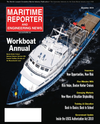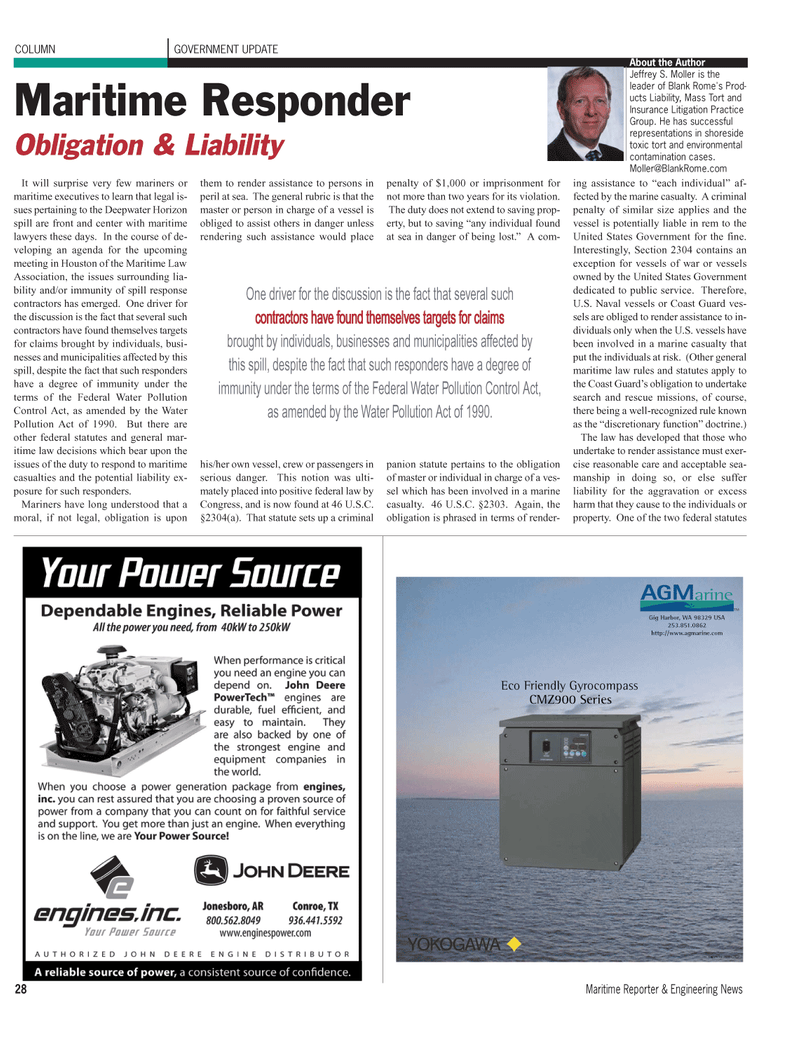
Page 28: of Maritime Reporter Magazine (November 2010)
Workboat Annual
Read this page in Pdf, Flash or Html5 edition of November 2010 Maritime Reporter Magazine
28 Maritime Reporter & Engineering News arine
TM
CMZ900 Series
Gig Harbor, WA 98329 USA 253.851.0862 http://www.agmarine.com
Eco Friendly Gyrocompass
Copywrite 2000~2007
COLUMN GOVERNMENT UPDATE
Maritime Responder
Obligation & Liability
About the Author
Jeffrey S. Moller is the leader of Blank Rome's Prod- ucts Liability, Mass Tort and
Insurance Litigation Practice
Group. He has successful representations in shoreside toxic tort and environmental contamination cases.
It will surprise very few mariners or maritime executives to learn that legal is- sues pertaining to the Deepwater Horizon spill are front and center with maritime lawyers these days. In the course of de- veloping an agenda for the upcoming meeting in Houston of the Maritime Law
Association, the issues surrounding lia- bility and/or immunity of spill response contractors has emerged. One driver for the discussion is the fact that several such contractors have found themselves targets for claims brought by individuals, busi- nesses and municipalities affected by this spill, despite the fact that such responders have a degree of immunity under the terms of the Federal Water Pollution
Control Act, as amended by the Water
Pollution Act of 1990. But there are other federal statutes and general mar- itime law decisions which bear upon the issues of the duty to respond to maritime casualties and the potential liability ex- posure for such responders.
Mariners have long understood that a moral, if not legal, obligation is upon them to render assistance to persons in peril at sea. The general rubric is that the master or person in charge of a vessel is obliged to assist others in danger unless rendering such assistance would place his/her own vessel, crew or passengers in serious danger. This notion was ulti- mately placed into positive federal law by
Congress, and is now found at 46 U.S.C. §2304(a). That statute sets up a criminal penalty of $1,000 or imprisonment for not more than two years for its violation.
The duty does not extend to saving prop- erty, but to saving “any individual found at sea in danger of being lost.” A com- panion statute pertains to the obligation of master or individual in charge of a ves- sel which has been involved in a marine casualty. 46 U.S.C. §2303. Again, the obligation is phrased in terms of render- ing assistance to “each individual” af- fected by the marine casualty. A criminal penalty of similar size applies and the vessel is potentially liable in rem to the
United States Government for the fine.
Interestingly, Section 2304 contains an exception for vessels of war or vessels owned by the United States Government dedicated to public service. Therefore,
U.S. Naval vessels or Coast Guard ves- sels are obliged to render assistance to in- dividuals only when the U.S. vessels have been involved in a marine casualty that put the individuals at risk. (Other general maritime law rules and statutes apply to the Coast Guard’s obligation to undertake search and rescue missions, of course, there being a well-recognized rule known as the “discretionary function” doctrine.)
The law has developed that those who undertake to render assistance must exer- cise reasonable care and acceptable sea- manship in doing so, or else suffer liability for the aggravation or excess harm that they cause to the individuals or property. One of the two federal statutes
One driver for the discussion is the fact that several such contractors have found themselves targets for claims brought by individuals, businesses and municipalities affected by this spill, despite the fact that such responders have a degree of immunity under the terms of the Federal Water Pollution Control Act, as amended by the Water Pollution Act of 1990.

 27
27

 29
29
